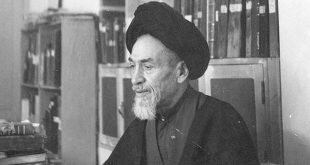
Born
Education
Besides learning classical subjects, he continued religious and theological lessons informally. In 1359, he formally commenced his preliminary lessons at the Islamic seminary in Rasht under the guidance of the scholars in Rasht. Then, he moved to the holy city of Mashhad to continue his education and passed the highest levels of education under the supervision of honourable scholars including Ayatollah Sabzevari, Salehi, Saeedi, Rezazadeh and Mortazavi and he also took part in the philosophy classes of the great philosopher, Sayyed Jalal Ashtiani.
In 1988, being interested in continuing his higher education and passing the course of Ijtihad, Professor Ramezani moved to Qom, the city of knowledge and Ijtihad and he benefited from the lessons of theosophy, Fiqh and Principles taught by honourable scholars including Ayatollah Fazel Lankarani, Vahid Khorasani, Makarem Shirazi, Jafar Sobhani, Bahjat Foomani, Madadi Khorasanin for 14 years. Being interested in Quranic studies, philosophy, ethics and mysticism, he took the lessons taught by honourable scholars including Allemeh Javadi Amoli, Allameh Hassan Zadeh Amoli, Ansari Shirazi, Haki Askari Gilani, Marefat and Dr. Ahmad Beheshti for 14 years.
After taking part in theological exams and completing his thesis, Ayatollah Ramezani received all the theological degrees from level 1 to level 4(considered as the doctorate degree). In 2005, he was accepted with a high degree in Ijtihad. Besides theological education, he has also completed his academic education and was awarded with a PhD.
Teaching
His skillfulness in explaining scientific subjects led him to teach and spread the Islamic literature and also taught subjects such as Arabic grammar, logic, philosophy, theosophy, mystics, ethics, interpretation of Qur’an , Fiqh and Principles of jurisprudence at all levels from beginners to higher level at Islamic seminaries in Rasht, Mashhad, Qom and Karaj.
Besides teaching at Islamic seminaries, he was engaged in teaching ethical courses, Hadith sciences, Persian mysticism and literature texts, the history of Islam, Islamic theosophy, new theosophy, Methodology, Interpretation and Fiqh Principles of jurisprudence at different universities.
Establishment
His other scientific works can be referred to as the establishment of the first research institute in the field of research on ethics called “the Institute of Religion and Ethics” in 2000; a member and evaluator in the field of philosophical and theosophy of Quran encyclopedia; a specialist in the field of Islamic sciences at different TV and Radio programs, an evaluator of the best books of Islamic seminary, supervisor and advisor of seminary and university theses at both masters and PhD levels, taking part and lecturing at universities inside and outside of the country and a member of the scientific group of Islamic thought and culture research centre from 1381 until now.
Responsibilities
Ayatollah Dr. Ramezani was responsible for managing Imam Ali Islamic Centre at Vienna for three years. Later on, from 30th April 2002, he was appointed as the Imam and director of Hamburg Islamic Centre and Shia representative in Hamburg to perform cultural and religious activities.
On 6th October 2012 and at the second meeting of universal Union of Shias in Germany Ayatullah Ramezani was unanimously elected as the boards head of scholars’ to supervise and referee this union.
Works
With regard to authorship, he has published numerous books and articles in different fields such as Quran, Fiqh, Hadith, mysticism, ethics, law and social, cultural and historical areas. Some of his books are named here:
1. Studying human beings
2. An introduction to divine names from the Quranic and mystic viewpoint
3. The issue of relationships in religious ethics
4. Religious pathological analysis of the movement of Ashura
5. Knowledge acquisition and epistemology (explaining visual hadith)
6. Faithfulness and believing in faith in the movement of Ashura (in Arab language)
7. Ethics and mysticism
8. An introduction to the essentials of Botany
9. Religious culture making in the movement of Ashura
10. A couple of Quranic investigations (a collection of articles)
11. Mystics (a collection of articles)
12. The rituals of Friday (a collection of articles)
13. A reflection of a convention on removing female discrimination
14. The life blast and rejuvenated life
15. Reforming role of Ashura
16. The call of Friday, the sermons of Friday prayer in Karaj
17. The ethical viewpoints of Allameh Tabatabaee
18. An introduction to ethical and legal system of a family
 Ijtihad Network Being Wise and Faithful Muslim in the Contemporary World
Ijtihad Network Being Wise and Faithful Muslim in the Contemporary World
